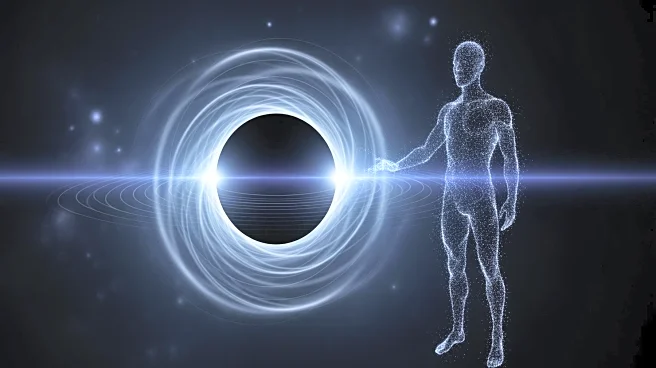What's Happening?
Professor of Physics Robert Scherrer has published a study in the International Journal of Modern Physics D examining the potential effects of primordial black holes passing through the human body. These
hypothetical black holes are believed to have formed in the early universe, possibly within the first second after the Big Bang, and may constitute some or all of the universe's dark matter. Scherrer's research investigates the gravitational effects, such as supersonic shock waves and tidal gravitational forces, that a primordial black hole could exert on human tissues. The study builds on previous research into macroscopic dark matter, which suggested that such matter could cause significant destruction to the human body. Scherrer aims to use these findings to better understand the properties of dark matter, including its mass.
Why It's Important?
The study of primordial black holes is significant as it contributes to the broader understanding of dark matter, a mysterious component of the universe that affects its structure and evolution. By exploring the potential impact of these black holes on human tissues, Scherrer's research could help scientists determine the mass and other properties of dark matter. This knowledge is crucial for astrophysics and cosmology, as it may provide insights into the formation and behavior of the universe. Additionally, understanding the effects of primordial black holes could inform safety measures in theoretical scenarios where such phenomena might pose a risk, although Scherrer notes that the likelihood of encountering a primordial black hole is extremely low.
What's Next?
While the study offers theoretical insights, Scherrer acknowledges that primordial black holes may not exist, and their density is so low that encounters with them are unlikely. However, the research could pave the way for further studies into dark matter and its properties. Scientists may continue to explore the implications of primordial black holes and other forms of dark matter, potentially leading to new discoveries in astrophysics. Future research could focus on detecting these black holes or understanding their role in cosmic phenomena, contributing to the ongoing quest to unravel the mysteries of the universe.
Beyond the Headlines
The exploration of primordial black holes touches on broader themes in physics and cosmology, such as the nature of dark matter and the fundamental forces governing the universe. Scherrer's study also highlights the intersection of science fiction and scientific inquiry, as the idea of a black hole passing through a human body was inspired by a story from the 1970s. This reflects the way imaginative concepts can drive scientific exploration and lead to real-world advancements. The research underscores the importance of theoretical studies in expanding our understanding of the universe, even when the phenomena being studied are unlikely to occur.











